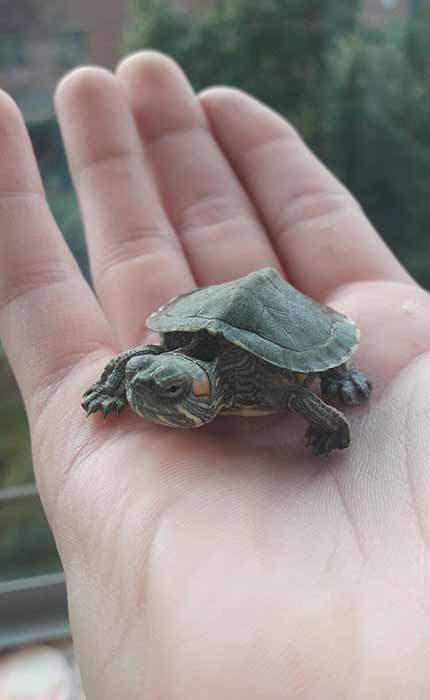If your turtle isn’t moving, it’s completely normal to ask yourself what is wrong. After all you don’t want your turtle to be sick. But fortunately, there are other possible reasons why your turtle is not moving.
If your turtle is not moving it could either be due to a health problem, in which case you should go to a veterinarian, or there might be something wrong with the environment, or it could be that your turtle is hibernating.
In this article, I will tell you how to differentiate between a sick turtle and a hibernating turtle, and I will also cover some possible causes. But my advice is to go to the vet whenever your turtle has a health problem. Online articles, no matter who writes them are for informative purposes, they won’t replace a face-to-face consultation.
How to Know if Your Turtle Is Not Moving Because It’s Hibernating
When turtles hibernate they will enter a very profound sleep, during which they won’t move at all. Turtles enter into this state when temperatures drop very low, around 50°F (10°C).
So the simplest way to know if your turtle is hibernating or not is to check the room and water temperature. If it’s 50°F or lower then your turtle is most likely hibernating.
Another significant difference between a hibernating turtle and a sick turtle is that hibernating turtles sleep with their legs retracted into their shell, and they retain complete muscle control. So if you pick your turtle up and the limbs fall down, or it’s sleeping with them unretracted, then your turtle is not hibernating.
Most pet turtles that are kept indoors, and stay at room temperature won’t hibernate, but if the temperature of the room is very low for a long period of time it might be something to take into consideration.
Your Turtle Might Not Be Moving Because It’s Basking
One other possibility is that your turtle is simply basking. When turtles bask they are basically taking a nap, during which they sleep relaxed with their limbs outside of the shell.
The simplest way to know if your turtle is basking and it’s not sick is to see if your turtle is in the basking area under the light. Pet turtles only bask in their basking area, or if you keep them outside under the direct sun.
Your Turtle Might Not Be Moving Because It’s Pregnant
Turtles will get “pregnant” even if they are alone in the tank.
Turtles are not like mammals, so they don’t need a partner to get pregnant, they will lay eggs periodically, which makes them more similar to chickens. If a male and a female live in the same tank the eggs might be fertilized, and baby turtles might get out of them, but if you only have a female, then no babies will come out of the eggs but the eggs will still appear.
When turtles are pregnant they will act quite strange, they won’t eat, they won’t move, or they will try to escape the tank. Their behavior can be quite unpredictable.
To see if this is the reason why your turtle is not moving I would suggest you read this article first to find out if your turtle is male or female: How to Tell If Your Turtle Is Male or Female (with Pictures), and if you have a female turtle, you should check out this article to see if she is pregnant: How to Tell if Your Turtle Is Pregnant (with Pictures).
Your Turtle Might Not Be Moving Due to It’s Bad Diet
Another possible problem can be that the diet of your turtle is not quite right.
Unfortunately, you can’t take a look at the shell of your turtle and figure out if this is the cause. Instead what you can do is to see how and what you should feed your turtle and see if you are doing this right.
To solve this problem you have to adjust the amount of food you give to your turtle as well as the food itself.
One great and simple way to give your turtle the correct amount of food is to use the size of the head method.
To put this method into practice is to find a small container, like a medicine cup, a shot glass, or a bottle cap. This container has to be approximately the same size as the head of your turtle, without the neck. Then you fill that container to the top with food. This is the amount of food that you should give your turtle every day.
As for the food itself, the right type of food will differ from turtle species to turtle species. But overall most turtle species are omnivores, which means that they eat fruits, vegetables, and meat. So a balanced turtle diet will contain all of the following:
- Fruits
- Vegetables
- Dried Insects
- Fish
- Meat
- Pellets
Your Turtle Might Not Be Moving Because It’s Stress
Turtles get stressed very easily. They can get stressed by excessive noises, by other pets, by improper handling, and many other things.
If your turtle gets stressed out, they will stop basking, eating, and sometimes they will even stop moving.
In this case, you have to eliminate all sources of stress. So let me give you a few examples of what could stress your turtle.
A loud stereo system that is placed right near the tank can cause a lot of stress for a turtle. A cat or a dog that is always trying to get in the tank can also cause a lot of stress. The best way to figure out if something is stressing the turtle is to try to put yourself in the turtle’s place. If you think that something would stress you, then it definitely stresses the turtle.
After you eliminate the stress sources your turtle should start to calm down soon, and it will go back to its normal behavior.
Your Turtle Might Not Be Moving Because It’s Scared
If you just got your turtle, then it’s absolutely normal for it to behave strangely. So it’s really common to see a turtle not moving too much.
Turtles can get scared very easily, and moving from a place to another can be very frightening for them. They will go from a small cramped tank, that they share with multiple turtles, to a new spacious tank where they can live alone. And if they were sent through the mail, they will be even more scared.
If this is the case for your turtle, you just have to let your turtle calm down a little. After about a week your turtle will get used to the new environment and will start acting normally. There is nothing you can do in this case, just make sure that you don’t scare your turtle any further.
Your Turtle Might Not Be Moving Due to Illness
As I said at the beginning of the article I don’t recommend people to treat their turtles or any other animal based on things that they read online, so I am not going to tell you any treatment. Instead, I am going to tell you a few things that might indicate that your turtle is sick and needs to see a vet.
Some of the most common signs that your turtle is sick are:
- White spots on the shell
- Transparent spots on the shell
- Shell discoloration
- Strangely colored spots on the skin
- Discharges coming out of the eyes, nose or ears
- Bubbles coming out of the mouth
- Swelling
- Cuts on the body or shell
- Excessive gasping, wheezing, and sneezing
If you notice anything on this list you should go to the vet immediately.
Final Thoughts
As turtles are not very expressive it can be quite hard to tell if they are sick or there is something wrong with their environment. But if something is not right with the environment, over time this will make them sick, so no matter why your turtle is not moving you have to solve the problem.
If by reading this article you figure out that the problem is that you weren’t feeding your turtle the right thing, or that she was stressed, you should still go to the vet. Turtles are quite hardy, so if something made them behave strangely, it’s worth having a vet take a look at your turtle.



I rescued a box turtle that had been hit by car was in middle of road 98 degree temp, had crack across beaks with bleeding and a small crack under shell brought her home to heal, she laid 4 eggs immediately when I cooled and cleaned her, she healed in 3 weeks, I make sure water available. Placed her outside in backyard under rocks, she is not moving much or eating much, seems to keep eyes closed alot will retract in she’ll when I touch her feet, took her back to a yard she was heading to left for days she didnt move, just wanted your opinion what to do
It’s great that you rescued the box turtle and helped her heal from the injuries. However, her current behavior does raise some concerns. Here are a few things to consider:
Stress: Box turtles can be stressed when placed in new environments, and this stress might affect their activity and appetite. If she’s been through a lot recently, it might take her some time to adjust.
Hibernation: Box turtles may enter a period of inactivity or hibernation, especially during the colder months. Depending on your location, if it’s late fall or winter, she might be preparing for or already in hibernation.
Reproduction: Laying eggs can be physically taxing for turtles, and it’s not uncommon for them to rest and recover afterward.
Health Check: Given her history of injuries, it’s essential to monitor her for any signs of infection or lingering issues related to the accident. Check for any visible wounds, swelling, or discharge.
Consult a Veterinarian: If she continues to display lethargy, not eating, or other concerning symptoms, it’s best to consult a veterinarian with experience in reptile care. They can perform a thorough examination to assess her condition and provide treatment if necessary.
It’s important to provide her with a quiet, stress-free environment and ensure she has access to fresh water and appropriate food. Keep monitoring her condition, and if her health does not improve, seek professional veterinary advice for a more accurate assessment of her well-being.
Hello my turtle has his head down on the floor he pick it up but I feel he puts back down I feel like he doesn’t have any energy is my turtle dieing
I’m not a veterinarian, but I can try to offer some general guidance. If your turtle is displaying unusual behavior, such as weakness or a lack of energy, it’s essential to monitor the situation closely and consider the following:
Temperature and Lighting: Ensure that your turtle’s habitat is at the correct temperature and that it has access to UVB lighting. Incorrect temperature and lighting can impact their activity and overall health.
Water Quality: Check the water quality in your turtle’s habitat. Poor water quality can lead to health issues. Maintain a clean environment with proper filtration.
Diet: Make sure you are offering your turtle a balanced and appropriate diet. Poor nutrition can affect their energy levels and overall well-being.
Stress: Ensure your turtle’s habitat is free from stressors, such as overcrowding or sudden changes in the environment.
Health Check: If you’re concerned about your turtle’s health, it’s advisable to consult with a veterinarian who specializes in reptiles. They can perform a thorough examination to diagnose any underlying issues.
Hydration: Ensure that your turtle has access to fresh, clean water. Dehydration can affect their energy levels.
Isolation: Sometimes turtles can act differently when they’re not feeling well. Providing a quiet, stress-free environment can be helpful.
If your turtle’s condition worsens or you remain concerned about its health, it’s best to seek professional veterinary advice as soon as possible. A reptile veterinarian can provide the most accurate assessment and guidance for your specific situation.